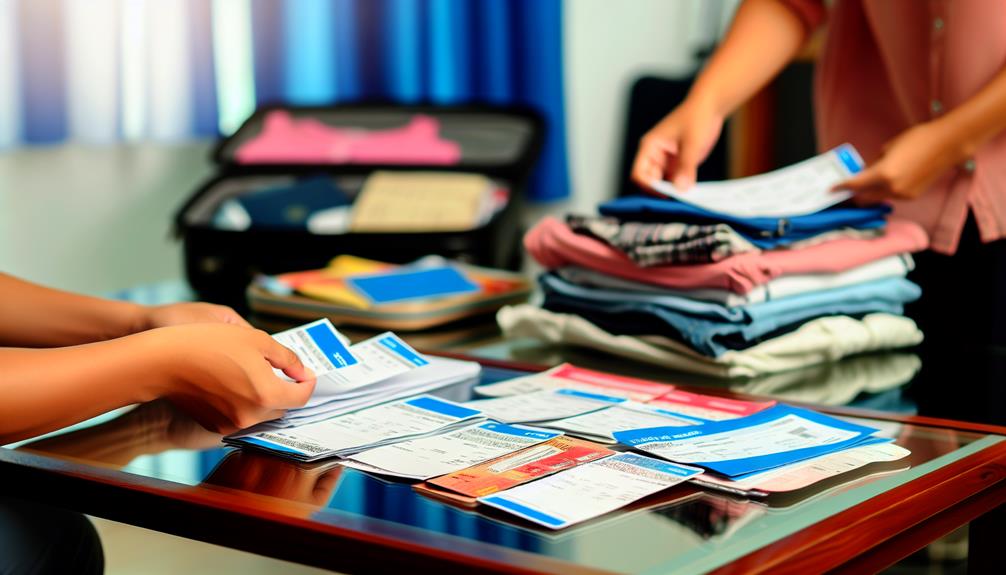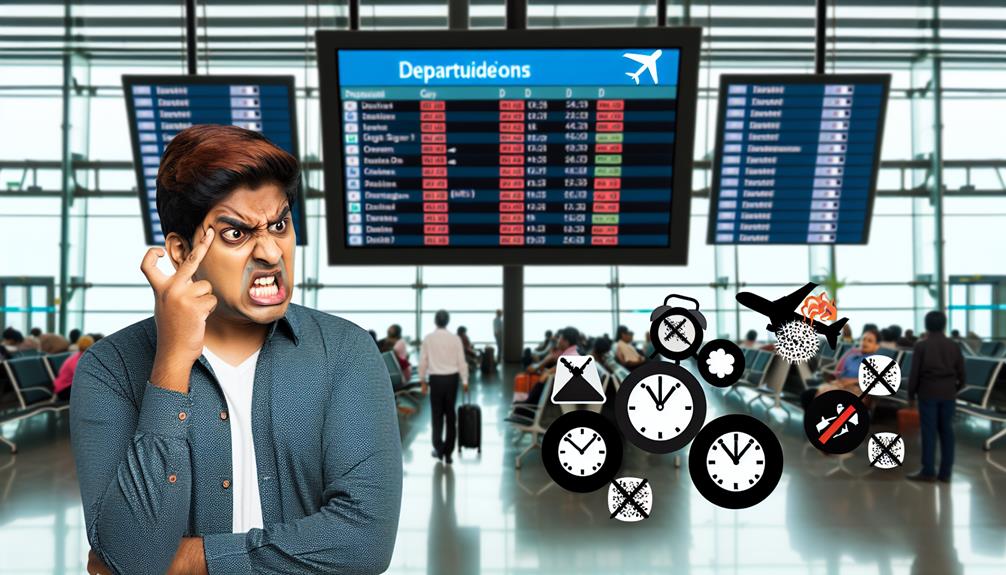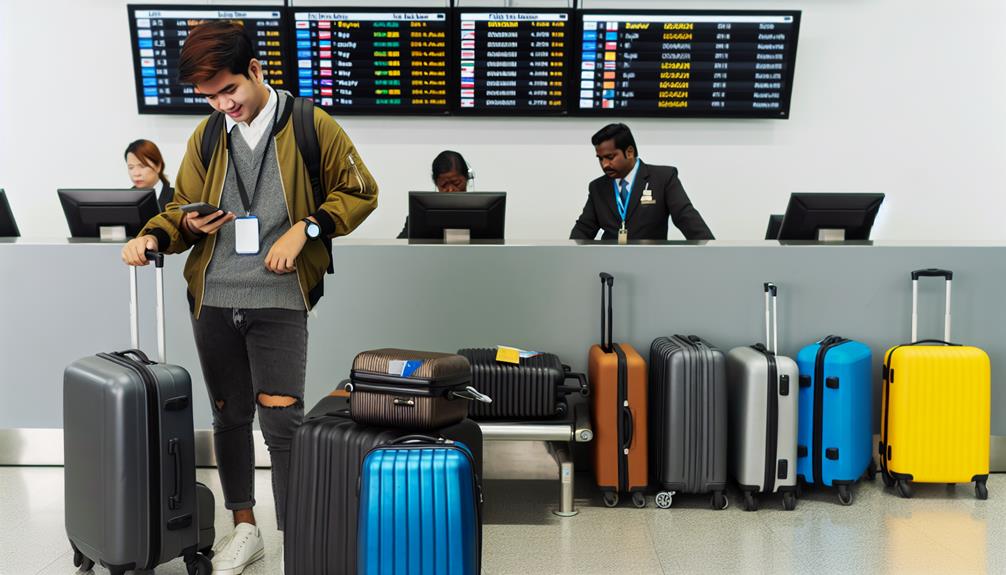To claim journey insurance for flight delays, start by contacting your insurance provider to report the delay. You'll need to gather important documents like your travel itinerary, boarding passes, and any receipts for expenses incurred during the delay, such as meals and accommodations. Confirm you have proof of the delay from the airline, like emails or notifications. Complete the claim form accurately, including your policy number. Remember to file the claim promptly to meet deadlines. Once you have everything ready, you'll be on your way to getting your reimbursement. More useful tips are just ahead to guide you through the process!
Key Takeaways
- Contact your insurance provider immediately to report the flight delay and initiate the claim process.
- Collect essential documentation, including your travel itinerary, boarding passes, and proof of the delay from the airline.
- Keep all receipts for expenses incurred during the delay, such as meals and accommodations, to support your claim.
- Complete the claim form accurately, attaching all required documents and your insurance policy number for reference.
- Submit your claim promptly to meet the provider's deadlines and ensure a smooth processing experience.
Understanding Journey Insurance
When planning your travels, understanding journey insurance is fundamental to protecting yourself against unexpected disruptions. One significant aspect is trip delay coverage, which reimburses you for expenses incurred due to unexpected flight delays. This coverage typically activates after a specified delay period, often between 3 to 12 hours, but only for covered reasons like severe weather or mechanical failures. Personal issues, such as oversleeping, won't qualify.
Before you buy a travel insurance policy, it's important to review the terms and exclusions. Understand what expenses are covered during a delay and the coverage limits that apply. For instance, some policies offer reimbursement limits up to $500 per trip for significant delays, while others may set daily caps.
When you need to claim for trip delays, you'll file insurance claims through user-friendly mobile apps or online portals. Be prepared with necessary documentation, including tickets, boarding passes, and receipts for incurred expenses. Knowing these details ahead of time can streamline the process and guarantee you receive the reimbursement you're entitled to. Understanding journey insurance helps you travel with confidence, knowing you're protected against the unexpected.
Steps to File a Claim
Filing a claim for journey insurance after a flight delay requires prompt action to guarantee you receive your reimbursement efficiently. Here's how to navigate the process smoothly:
- Contact your insurance provider: Notify them about the delay and your intent to file a claim. Remember, timely notification is essential.
- Gather necessary documentation: Collect your itinerary, boarding passes, receipts for expenses incurred during the delay, and any correspondence with travel providers.
- Complete the claim form: Use the form provided by your insurer, making sure you include all required details and supporting documents. This helps avoid delays in processing your claim.
- Keep copies of everything: Maintain records of all submitted documents and correspondence for future reference, especially if you need to follow up.
Be aware of your policy's coverage limits and the timeframes for filing claims, as reimbursement amounts and eligibility can vary considerably between different insurance plans. By following these steps, you'll position yourself well for a successful claim and guarantee you get the compensation you deserve for the unexpected expenses incurred during your travel delay.
Required Documentation

To successfully file a claim for journey insurance after a flight delay, you'll need to gather specific documentation to support your request. Start with your travel itinerary and boarding passes, as these are essential for verifying your travel plans. Next, obtain proof of the delay from the airline, which might include emails or messages they sent regarding the situation.
It's critical to keep all receipts for any expenses you incurred during the delay, such as meals, accommodations, and transportation. These will be necessary for reimbursement. Additionally, some insurers require you to document the reason for the delay, so save any communication from the airline that explains the cause and duration.
Make certain you have your insurance policy number on hand, as you'll need it when completing your claim form. Finally, remember to submit your claim promptly, often within a specified time frame, such as 30 days after the delay. Acting quickly can help guarantee you don't miss the deadline for your reimbursement. With the right required documentation, your journey insurance claim process will be smoother.
Tips for a Smooth Claim
How can you guarantee your journey insurance claim goes smoothly? By following these essential tips, you can streamline the process and maximize your chances of a successful claim for your travel insurance.
- Gather Documentation: Collect your policy number, travel itinerary, boarding passes, and receipts for any expenses incurred during the delay.
- Understand Delay Coverage: Familiarize yourself with your insurance policy's terms, focusing on the required delay period and eligible expenses to claim effectively.
- Utilize Online Tools: Use your insurer's mobile app or website for prompt submission. Many providers allow you to file and track claims easily online.
- Maintain Communication Records: Keep a detailed log of all communications with airlines and travel providers during the delay, as this can support your claim.
Make certain to file your claim as soon as possible, adhering to any deadlines set by your insurance provider. By being organized and proactive about your documentation and submission, you can guarantee that your claim process is as smooth as possible. Don't let a delay derail your travel plans—take control of your insurance claim!
Common Exclusions and Limitations

While you might expect your journey insurance to cover all delays, several common exclusions and limitations can catch travelers off guard. First, delays caused by personal reasons—like oversleeping, missing a flight, or not checking in on time—aren't covered. If your trip is delayed due to strikes or civil disturbances, those expenses incurred might also be excluded since they're often seen as outside the insurer's control.
Moreover, keep in mind that some insurance policies impose limitations on reimbursement amounts. For instance, meal reimbursements might be capped at a specific daily limit, so you'll need to plan accordingly. It's also vital to check the delay period specified in your policy; many require you to wait anywhere from 3 to 12 hours before benefits kick in. Claims for shorter delays could be denied, leaving you with unexpected out-of-pocket expenses. To avoid surprises, thoroughly read your travel delay insurance policy and understand what's considered covered reasons. This way, you'll be better prepared to navigate the claims process, knowing what you can expect to receive in reimbursement.
Frequently Asked Questions
Can Travel Insurance Cover Delayed Flights?
Yes, travel insurance can cover delayed flights, but it depends on your policy's terms. Typically, if your flight's delayed for a specified minimum time, you can get reimbursed for necessary expenses like meals and accommodations. Just remember, not all delays qualify—common reasons include bad weather or mechanical issues. To claim, you'll need to gather documentation like receipts and boarding passes to support your case. Always check your policy for specific coverage details.
How to Prove Flight Delay for Insurance?
To prove a flight delay for insurance, you'll need official documentation from the airline, like a delay notification or updated itinerary showing the duration and reason. Keep track of all travel-related receipts for expenses incurred during the delay. Don't forget to save any communications with the airline, and guarantee you have copies of your boarding passes. Familiarizing yourself with your insurance policy's requirements will help make your claim valid.
How Do I Claim My Flight Delay Compensation?
To claim your flight delay compensation, start by checking your airline's policies regarding delays. Gather all necessary documents like your itinerary and boarding passes. Then, contact the airline or relevant compensation service, and express your intent to file a claim. Submit the required forms and documentation, which may include receipts for any expenses incurred. Keep copies of everything you send and follow up regularly to guarantee your claim progresses smoothly.
Does My Insurance Cover Delayed Flights?
Yes, your insurance often covers delayed flights, but it's essential to check your policy. Most plans activate after a delay of 3 to 12 hours and usually cover specific reasons like bad weather or mechanical issues. However, personal errors that lead to missed connections might not be included. Look for details on reimbursement limits for meals and accommodations, and keep your tickets and receipts handy to support your claim.
